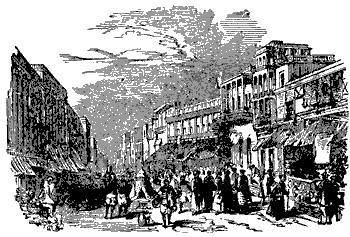| Strangers to Us All | Lawyers and Poetry |
|
John Lathrop, Jr. John Lathrop, Jr. was the son of a prominent Boston clergyman, minister of the Second Church of Boston, a man of letters who served as librarian of the American Academy of Arts and Sciences and received various honorary degrees from Europe. Lathrop's uncle was the historian John Lothrop Motley. Lathrop, Jr., entered Harvard at the age of fourteen, and graduated in 1789 where he delivered a poem at the commencement exercises at his graduation. His poetry, even at this early date, appears in the Massachusetts Magazine.
Lathrop took up the practice of law in Boston but in 1797 moved to Dedham. But his residency there was a short one and he returned to Boston where he took up the company of Robert Treat Paine, Jr., Charles Prentiss and others involved with the Federal Boston Gazette. Lathrop grew discouraged with his situation in Boston and decided to try his fortunes in British India where he established a school in Calcutta.
Bazaar on the Chitpore Road, Calcutta Lathrop returned to the United States in 1819 with the idea of starting a new literary journal but he ended up as a Boston school teacher, while continuing his literary endeavors. Again, weary of what had befallen him, Lathrop departed for the South, and took up residence in Washington, D.C., where he was a teacher, writer, and lecturer. He finally secured employment in the post office. He died in Georgetown, January 30, 1820. [Source: Evert A. & George L. Duyckinck, The Cyclopedia of American Literature 637-639 (Philadelphia: William Rutter & Co., 1880)(Vol. 1); Stanley Kunitz & Howard Haycraft (eds.), American Authors 1600-1900: A Biographical Dictionary of Literature (New York: H.W. Wilson, 1938)][See also: National Cyclopaedia of American Biography 135 (New York: James T. White & Co., 1897)(vol. 7)] Poetry John Lathrop, The Speech of Canonicus, or, an Indian Tradition (Boston: David Carlisle, 1903) Bibliography Lewis Leary, John Lathrop, Jr.: The Quiet Poet of Federalist Boston (Worcester, Massachusetts: American Antiquarian Society, 1981)(Vol. 91 (1) Proceedings of the American Antiquarian Society 39-89 (1981) |
